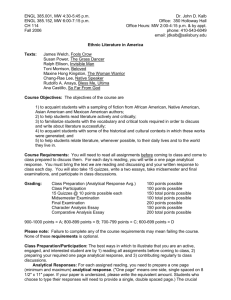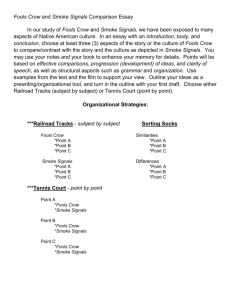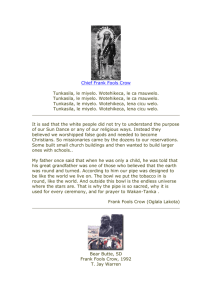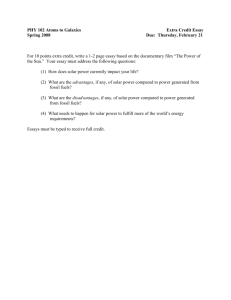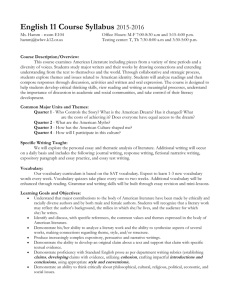ENGL 384.001, MTuWTh 2:00-2:50 p.m. John Kalb 263 Perdue Hall
advertisement
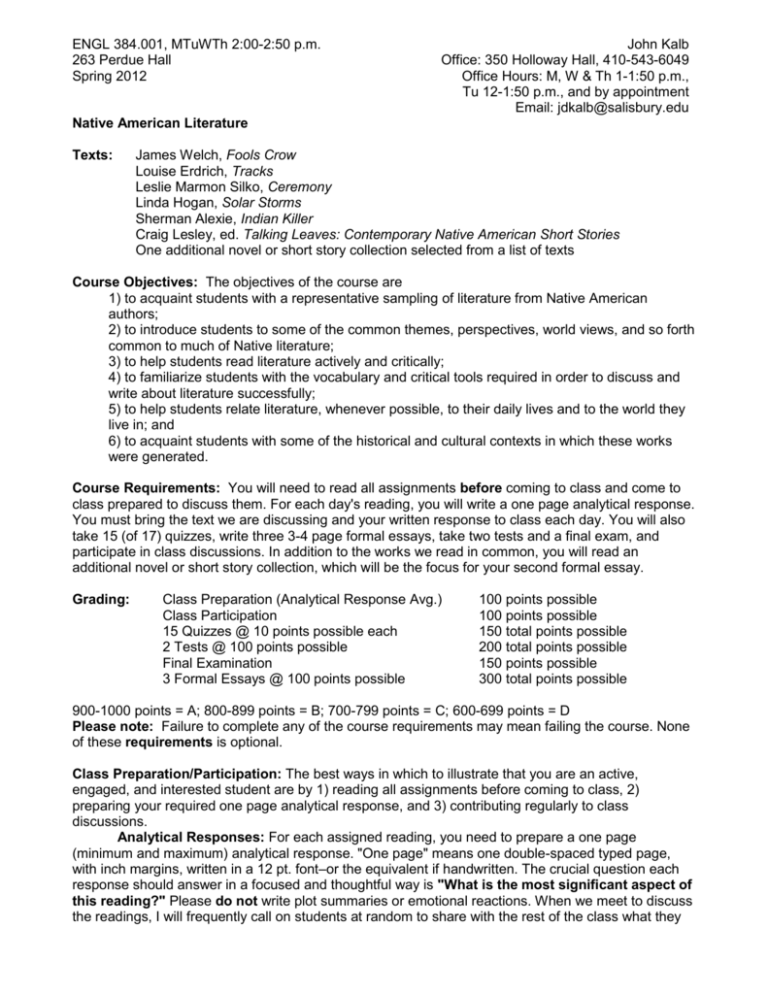
ENGL 384.001, MTuWTh 2:00-2:50 p.m. 263 Perdue Hall Spring 2012 John Kalb Office: 350 Holloway Hall, 410-543-6049 Office Hours: M, W & Th 1-1:50 p.m., Tu 12-1:50 p.m., and by appointment Email: jdkalb@salisbury.edu Native American Literature Texts: James Welch, Fools Crow Louise Erdrich, Tracks Leslie Marmon Silko, Ceremony Linda Hogan, Solar Storms Sherman Alexie, Indian Killer Craig Lesley, ed. Talking Leaves: Contemporary Native American Short Stories One additional novel or short story collection selected from a list of texts Course Objectives: The objectives of the course are 1) to acquaint students with a representative sampling of literature from Native American authors; 2) to introduce students to some of the common themes, perspectives, world views, and so forth common to much of Native literature; 3) to help students read literature actively and critically; 4) to familiarize students with the vocabulary and critical tools required in order to discuss and write about literature successfully; 5) to help students relate literature, whenever possible, to their daily lives and to the world they live in; and 6) to acquaint students with some of the historical and cultural contexts in which these works were generated. Course Requirements: You will need to read all assignments before coming to class and come to class prepared to discuss them. For each day's reading, you will write a one page analytical response. You must bring the text we are discussing and your written response to class each day. You will also take 15 (of 17) quizzes, write three 3-4 page formal essays, take two tests and a final exam, and participate in class discussions. In addition to the works we read in common, you will read an additional novel or short story collection, which will be the focus for your second formal essay. Grading: Class Preparation (Analytical Response Avg.) Class Participation 15 Quizzes @ 10 points possible each 2 Tests @ 100 points possible Final Examination 3 Formal Essays @ 100 points possible 100 points possible 100 points possible 150 total points possible 200 total points possible 150 points possible 300 total points possible 900-1000 points = A; 800-899 points = B; 700-799 points = C; 600-699 points = D Please note: Failure to complete any of the course requirements may mean failing the course. None of these requirements is optional. Class Preparation/Participation: The best ways in which to illustrate that you are an active, engaged, and interested student are by 1) reading all assignments before coming to class, 2) preparing your required one page analytical response, and 3) contributing regularly to class discussions. Analytical Responses: For each assigned reading, you need to prepare a one page (minimum and maximum) analytical response. "One page" means one double-spaced typed page, with inch margins, written in a 12 pt. font–or the equivalent if handwritten. The crucial question each response should answer in a focused and thoughtful way is "What is the most significant aspect of this reading?" Please do not write plot summaries or emotional reactions. When we meet to discuss the readings, I will frequently call on students at random to share with the rest of the class what they have identified as significant in their responses as a means of beginning our class discussion. Quite often, I will collect, respond to, and grade these responses, but whether I collect them or not, these writings are part of your class preparation. A separate handout explains this requirement in more detail. Quizzes: You can expect a brief quiz on the date each story or portion of a novel is first due to be read. There will be quizzes on 17 of those dates. You need only take 15 quizzes. If you take all 17 quizzes, I will drop your lowest 2 quiz grades. Quizzes will consist of questions which should be easily answerable by anyone who has read the assignment carefully. If you wish to take a quiz, you must arrive on time. There will be no make-up quizzes. If you do not attend class on the day of a quiz or arrive too late to take a quiz, you forfeit those 10 possible points. Tests and Final Examination: The two tests and final examination will be partially objective and partially essay. Except in extreme circumstances, there will be no make-up tests. Formal Essays: You will receive detailed handouts for each of these three 3-4 page essay assignments. A brief description of each follows: Due on Tuesday, March 6, the first essay will entail an analysis of a “time immemorial” story or any oral story in either Fools Crow or Tracks and the relationship between that story and the “main story” of the novel itself. For the second essay, due on Thursday, April 5, you will write about a specific issue, problem, dilemma, or conflict which you discover in the additional text you will be reading for this course. Students must finish their first reading of the additional novel or short story collection by no later than Monday, March 12, and each student will meet with me in my office shortly thereafter (or perhaps before) to discuss the text and possible plans for the second essay. For the third essay, due on Tuesday, May 8, you will examine one (or more) of the works read since Tracks in light of one of the four “commonalities” of Native American world view. (This will make much more sense to you once we get the course started.) Late papers will be graded 10 points lower for each day (or portion) they are late. The numerous writing activities--both informal and formal--indicate that the instructor is a firm supporter of writing as a means of learning and of SU's Writing Across the Curriculum policy. Special Note: All students taking this course to fulfill their English/Secondary Education [or TESOL] requirement must begin a technology portfolio and must include at least one paper/project from this course in the portfolio. Plagiarism: The English Department takes plagiarism, the unacknowledged use of other people's ideas, very seriously indeed. As outlined in the Student Handbook under the "Policy on Student Academic Integrity," plagiarism may receive such penalties as failure on a paper or failure in the course. The English Department recognizes that plagiarism is a very serious offense and professors make their decisions regarding sanctions accordingly. Each of the following constitutes plagiarism: 1. Turning in as your own work a paper or part of a paper that anyone other than you wrote. This would include but is not limited to work taken from another student, from a published author, or from an Internet contributor. 2. Turning in a paper that includes unquoted and / or undocumented passages someone else wrote. 3. Including in a paper someone else's original ideas, opinions or research results without attribution. 4. Paraphrasing without attribution. 5. Turning in the same paper for credit in more than one class. A few changes in wording do not make a passage your property. As a precaution, if you are in doubt, cite the source. Moreover, if you have gone to the trouble to investigate secondary sources, you should give yourself credit for having done so by citing those sources in your essay and by providing a list of Works Cited or Works Consulted at the conclusion of the essay. In any case, failure to provide proper attribution could result in a severe penalty and is never worth the risk. Attendance: Your success in the course will be contingent upon your preparation for and participation in class sessions. You may miss four class meetings (for whatever reason) without direct penalty. For each day you are absent beyond those four “freebies,” you will lose 25 points per day. If you have a schedule conflict with this class, you should select a course that better fits your schedule. Remember that YOU are responsible for meeting deadlines and making up any missed work. There is no such a thing as an “excused absence.” I will, of course, also expect you to arrive promptly for class and stay for the duration of each session. Three “lates” will constitute an absence (see the attendance policy above). Schedule your other activities around this course, not vice versa. In addition, students who come to class ill-prepared (i.e., without the novel or stories we’re discussing, having not read the assignment) may be asked to leave the classroom and invited to return another day on which they are better prepared. Courtesy and Respect: I expect students to treat their fellow students and professor with courtesy and respect. Please abide by the following: # # # # # Turn your cell phones, pagers and other electronic devices OFF before entering the classroom and do not turn them ON until you are OUTSIDE the classroom. Take care of your dietary and eliminatory needs PRIOR to entering the classroom. Should you absolutely need to arrive late or leave early for a class session, sit as near to the door as possible and avoid disrupting class by drawing attention to your entry or exit. Listen attentively to what your professor and fellow classmates contribute to our discussions. Raise your hand and wait to be acknowledged before you enter the discussion. Office Hours: Monday, Wednesday & Thursday, 1-1:50 p.m., Tuesday 12-1:50 p.m. These times are set aside for you; don't hesitate to take full advantage of my availability at that time. Please feel free to speak with me about any concerns or interests during those hours or, if those times are inconvenient, by appointment. Assignment Calendar Please Note: Reading assignments from Talking Leaves are indicated by TL. All readings are to be completed (as are analytical responses) before class. Jan. Feb 30: 31: 1: 2: 6: 7: 8: 9: Introduction to Course Introduction ctd. Basic Elements of Fiction Last Stand at Little Big Horn (video) Fools Crow (through 58) Fools Crow (through 125, to Part Two) Fools Crow (through 202, to Part Three) Fools Crow (through 284, to Part Four) 13: 14: 15: 16: Fools Crow (to end) No class Fools Crow Oren Lyons: The Faith Keeper (video) 20: 21: 22: 23: Tracks (through 31, to Chapter Three) Tracks (through 95, to Chapter Five) Tracks (through 164, to Chapter Seven) Tracks (to end) 27: Tracks 28: 29: March 1: TEST #1 Ceremony (through 63) Ceremony (through 168) 5: 6: 7: 8: 12: 13: 14: 15: 19-22: 26: 27: 28: 29: April May 2: 3: 4: 5: Ceremony (to end) Ceremony Paper #1 Due Paula Gunn Allen, "Deer Woman,” TL Anita Endrezze, “The Humming of Stars and Bees and Waves,” TL Discussion of additional texts You need to have your additional text read by this date and be prepared to speak with us about it. Discussion of additional texts ctd. In the Light of Reverence (video) In the Light of Reverence (video) Solar Storms (through 59, to Chapter Nine) NO CLASS, SPRING BREAK Solar Storms (through 113, to Chapter Nine) Solar Storms (through 195, to Chapter Twelve) No Class–Away at NALS No Class–Away at NALS Solar Storms (through 265, to Chapter Eighteen) Solar Storms (to end) Solar Storms Vickie Sears, "Dancer," TL Paper #2 Due 9: 10: 11: 12: TEST #2 Reel Injun (video) Reel Injun (video) Indian Killer (through 153, to Part 2) 16: 17: 18: 19: Indian Killer (through 296, to Part 3) Indian Killer (to end) Indian Killer Smoke Signals (video) 23: 24: 25: 26: Smoke Signals (video) Mickey Roberts, “It’s All in How You Say It,” TL Elizabeth Cook-Lynn, “A Visit from Reverend Tileston, TL Greg Sarris, "How I Got to Be Queen," TL 30: 1: 2: 3: Maurice Kenny, “Wet Moccasins,” TL Gerald Vizenor, "The Baron of Patronia" & "China Browne,” TL Louise Erdrich, “The Bingo Van,”TL Carter Revard, “Never Quite a Hollywood Star,” TL 7: 8: 9: 10: Thomas King, "A Seat in the Garden," TL Pow-Wow Highway (video) Paper #3 Due Pow-Wow Highway (video) Wrap-up Final Exam: Tuesday, May 15, 1:30 - 4:00 p.m. NOTE: This schedule of assignments is subject to change, with notice, of course.
